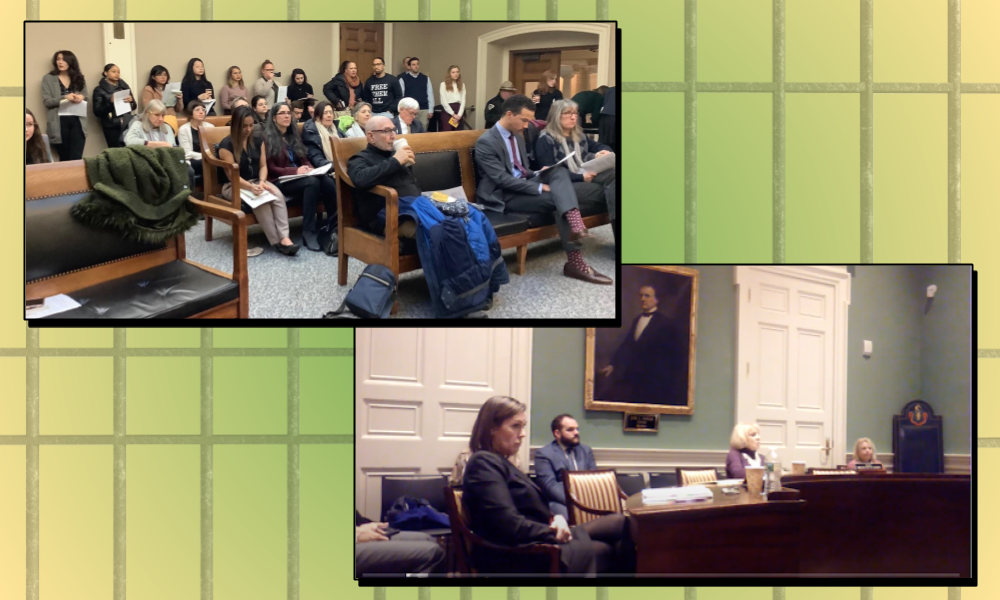Left: A packed briefing on parole issues at the Massachusetts State House (Jan. 2020). Photo by Jean Trounstine. Right: Parole Board Chair Gloriann Moroney at her parole confirmation hearing before the Governor’s Council (Jan. 2019).
“Most prisons and many jails have done very little to reduce the population density that puts both incarcerated people and staff at grave risk.”
With coronavirus spreading throughout Commonwealth prisons, lawsuits filed last week denounced the Massachusetts Parole Board, calling it both “deliberately indifferent” and part of the mechanism currently violating the rights of prisoners.
The third week of April was a milestone in many ways for those concerned with the state’s lack of response in its prisons and jails. As of April 20, 319 prisoners and staff had tested positive for COVID-19, while five prisoners had died.
Supposedly to stem the spread of COVID-19, prisoners were initially locked in their cells for 23-plus hours a day for two weeks. Most of them are still locked, with no end in sight. The Committee for Public Counsel Services (CPCS) condemned how little action there has been to release prisoners since the Supreme Judicial Court (SJC) issued its April 3 ruling, which said only some prisoners could seek release. Along with the Massachusetts Association of Criminal Defense Lawyers (MACDL), CPCS filed a motion declaring that modifications in the ruling are “necessary to save lives.”
On April 17, Prisoners’ Legal Services of Massachusetts (PLS) filed a class-action lawsuit on behalf of prisoners to significantly reduce the state’s prison population. The litigation recognizes that the way to stem “the harm caused by COVID-19 in prisons and their surrounding communities” is to force those responsible for inaction to take action, beginning with Governor Charlie Baker, who declared at a press conference on March 31, “We believe the correct position is for us to continue doing the things we’re doing to keep the people inside safe, and that’s gonna be the way we play this one.”
Also sued in the PLS lawsuit:
- Department of Correction Commissioner Carol Mici, who at the end of March told the SJC that the department “has taken steps to prevent the introduction or transmission of COVID-19.”
- Executive Office of Public Safety and Security Secretary Thomas Turco, who is responsible for those civilly committed to addiction treatment.
- Gloriann Moroney, the Parole Board chair who acknowledged in a statement to the SJC that in spite of COVID-19, the body “has made no efforts to accelerate the scheduling of parole hearings.”
Before coronavirus
“I think people do not really realize how significant the Parole Board is,” CPCS attorney David Rangaviz said in a phone interview. He wonders if “the difference between liberty and life will make the [Parole Board] take action.” Rangaviz is on the team of lawyers who filed CPCS litigation.
Even before the COVID-19 emergency, the parole system in Mass was demonstrably dysfunctional. It has four times more staff than earlier boards, but is known for its “inefficiency, culture of fear, hostile work environment, and mismanagement.” As PLS Executive Director Elizabeth Matos said at a Governor’s Council hearing last June, “The number one thing we hear about in the last decade from prisoners is problems with parole. Parole is not being used as a public safety tool the way it should be.”
Parole gives prisoners the opportunity to complete sentences in the community, under supervision. In Mass, one, two, or three members of the seven-member board determine chances at freedom for all who are serving non-life sentences, while the whole board votes to determine the fate of those serving life-with-parole sentences. The Parole Board’s function is to decide if there’s a “reasonable probability” the prisoner will not violate the law or be a danger to society. Thus, in normal times, the board must consider completion of rehabilitative programs behind bars, release plans, and risk of recidivism in addition to the crime of conviction of each petitioner.
In 2018, a Massachusetts Parole Board report showed that it conducted approximately 5,300 hearings to decide if people in Department of Correction (DOC) and House of Correction (HOC) custody should be released with supervision into the community. That same year, those sentenced for non-life crimes had positive votes for parole release hearings approximately 67% of the time. That does not mean they were all released, however. Many had to wait so long to get parole permits that they decided to complete their sentences and go unsupervised into the community. Meanwhile, even as studies nationwide have shown the safest group to release from prison are lifers, men and women sentenced to life in Mass only received positive votes for parole 25% of the time between 2015 and 2018.
As I reported in 2019, nearly 87% of parole violations that returned people to prison in Mass between 2015 and 2018 were technical (non-criminal), for infractions such as missing a check-in or having dirty urine. Moroney, the Parole Board chair, told the SJC that “absconding from parole supervision … does not usually result in new charges, but is still considered a risk to public safety.”
In a virtual presentation to the Boston Bar Association on April 13, Rangaviz of CPCS spoke to attendees, mostly lawyers, about some of the Parole Board’s historically troublesome issues. He cited extremely long wait times after parole hearings—almost a year—and called out the body for not individualizing decisions in 44 cases in which juveniles were convicted of life crimes.
Additionally, the Parole Board has not commuted any sentences or approved any pardons with Governor Baker in office. Chair Moroney testified at her 2019 confirmation hearing before the Governor’s Council that approximately 250 commutation and pardon petitions had still not been acted on by the Parole Board, and thus had not reached the governor’s desk for approval.
Surprise visits
Before COVID-19, David (who fears repercussions and asked for his last name to be omitted) was sentenced to two-to-four years in a Pennsylvania prison after being caught with one pound of weed. He earned parole after two years and was only required to see his parole officer once a month. But when he moved to Massachusetts in 2019—after marijuana was regulated and legalized—his new parole officer told him he needed to wear a GPS monitor. He balked, and the PO’s supervisor ordered him to wear an ankle bracelet. David was also given a 10 pm curfew and monitored monthly for drug and alcohol use with breathalyzer and urine tests.
Thirty-six years old, David lives with his family; after COVID-19 struck, he had their support. Still, he lost his job as a janitor, and has not yet heard back about a claim he filed with unemployment. David hasn’t had a drug or alcohol test in over a month. “The parole agent doesn’t step into my house,” he said, “just meets me once a month on the porch with a mask.”
Dion Young, who has been on parole in Mass for more than 13 years, asked rhetorically, “What is the validity of these urinalysis tests and other requirements if they aren’t required during the pandemic?” After weeks of no communication, he heard from parole on April 15, when his assigned officer came to his place of employment during his lunch break (without a mask on, Young noted). In a phone interview, he said the officer who surprised him did not provide any update on the requirements he had before COVID-19 hit—fees, urine screens, Alcoholics Anonymous meetings. Prior to that visit, all David had been given was a flyer about hand-washing and social distancing.
It is unclear if there is any exact statewide parole protocol. According to the April 12 email from Massachusetts Executive Office of Public Safety and Security (EOPSS) spokesman Jake Wark, “For individuals who are already on parole, officers are extremely mindful of public health guidance: they are working with their clients to explore remote options for behavioral health needs, and they’re using common sense when it comes to parolee employment, education, and other requirements.”
The lawsuits
The pandemic is magnifying problems in the system. According to both the PLS and CPCS lawsuits, the Parole Board: has failed to look at cases in the context of the COVID-19 emergency; is not weighing the danger posed to the 16,500 Massachusetts prisoners by continued incarceration; and is willfully blocking the “actual parole release of previously-approved individuals.”
An April 16 statement of the Massachusetts Advisory Committee to the US Commission on Civil Rights, Regarding COVID-19 and Incarcerated Persons in the Commonwealth, criticized the board’s average wait time for release. As the Council of State Governments Justice Center noted when it evaluated parole effectiveness in Mass in 2015, prisoners wait an average of 200 days for release after they have been approved for parole.
In its suit, PLS chastised the board for having “over 300 prisoners whom it had already approved for parole but who remained incarcerated.” According to the CPCS motion asking the Supreme Judicial Court to release more people:
Releases have been limited; 449 people have been released pursuant to this order, and since April 7, the total incarcerated population has only decreased by 5.69%. The parole board, to our knowledge, is still requiring people with a positive parole vote to move to a long-term residential facility or step down to a lower security facility—during a time when no transfers are permitted—before they will be released….It appears that only 58 [of the 300] have since received [parole permits]….Meanwhile…the situation is dire.
The 449 released were mostly pre-trial detainees held without bail. Only 58 sentenced prisoners, ones who earned parole, were actually freed to serve the remainder of their sentences in the community. But it is unclear if those 58 were actually approved to be released long before COVID-19.
The American Civil Liberties Union (ACLU) is keeping some COVID-19 data on prisons and jails, while there are also weekly reports from the state as a result of the aforementioned April 3 SJC ruling that only allows some prisoners to seek release. These weekly reports indicate the incarceration and release rates from across all Mass correctional facilities, as well as the number of COVID-19 tests and cases in each prison or jail—but there have been few statistics reported about parole, and the board is not forthcoming.
Wark, the EOPSS spokesman, wrote in an email response to my inquiries on April 13: “Parole has been working with correctional agencies, the defense bar, and other stakeholders to ensure that parole hearings continue, and staff are using videoconferences to provide a safe and efficient alternative to appearing in person: last week alone, Parole held 52 hearings. In addition, 58 individuals were issued parole permits and released on supervision.”
In a follow up email I asked: if the 58 prisoners had actually been approved for parole before the coronavirus hit; if the rest of the 300 people were not released because they did not have home plans; and for the vote results of the 52 hearings he mentioned. In response, Wark wrote that I should file a public records request (I will, but this information should readily be available).
The lifers
According to the mass.gov website where lifer decisions are posted, three of the 22 men serving life sentences received positive Parole Board votes since March 23 and were told they had spots in re-entry facilities, but are still behind bars. According to people who know the system, either beds became unavailable as the Parole Board dragged its feet, or prisoners are being kept in place due to concerns related to coronavirus.
Of those 22 lifers, 19 received their positive votes in what the Parole Board is calling “abbreviated decisions.” With the hope of getting out immediately, they waived their right to a full printed decision. The arrangement, offered by the Parole Board “in response to the COVID-19 pandemic,” can pose a catch-22: most who received positive votes were told that they must serve 12 or 18 months in lower security before being released. Instead of going directly home or even completing their time in a re-entry facility, they were given these “step-down” requirements, requiring they stay incarcerated. They will eventually get out, but not for months, thus risking more exposure to coronavirus.
Attorney Stephen Weymouth said one of his clients, lifer Antonio Ferrer, received a positive parole vote on March 26 in an abbreviated decision. The caveat was that Ferrer, who was 14 years old at the time of his crime in 1992 and sentenced as an adult, was supposed to go to a long-term residential program for six months before going home. In an April 14 phone interview, Weymouth said, “I was thinking everything was fine. Yesterday, he [Ferrer] was told that the program to which he’d been accepted temporarily shut down and is not accepting new clients.” Weymouth will petition the Parole Board to reconsider and send Ferrer home.
At this point, because Massachusetts, unlike some states, is not releasing classes of prisoners, attorneys have to file requests for relief on a case-by-case basis. Washington state, for example, is releasing a group of 1,167 prisoners, many near the end of their sentences, to stem the spread of the virus.
Such roadblocks infuriate Stacey Borden, the founder and president of New Beginning Re-entry Services. Borden, who was once incarcerated herself, said in an interview that she has had to advocate for her childhood best friend, William Goforth, who received a positive parole vote on March 10 of this year after a hearing held on June 13, 2019.
“Why would they take nine months to make that decision since he wasn’t even a risk to public safety?” Borden said. Considering the harrowing headlines—in one case, 1,828 prisoners (73%) at an Ohio prison tested positive for coronavirus—it’s no wonder she asked, “Why not let him go home where he would be safe?” In the meantime, Borden found Goforth a lawyer and talks to him almost every day. “These men are scared,” she said. “The only thing that gives him hope is that he is going to come out.”
Death sentence
On April 3, DOC Commissioner Mici told the SJC that she limited transfers between institutions because of coronavirus, and that basically no one is being moved. But for families trying to follow the plight of their loved ones from the outside, the picture has been far from transparent.
Two prisoners’ wives heard on April 17 that their husbands, both housed at North Central Correctional Institution in Gardner (NCCI), are to be transferred—but with no timeline. The men thought they were going to Northeast Correctional Center in Concord (NECC), where they hoped to move from minimum security to prelease. Instead, prisoners were informed by officers that they are going to Old Colony Correctional Center (OCCC), where there is some minimum security but no known prerelease program.
In response to the current conditions, one prison rights advocate tweeted: “This winter a man at NCCI was granted parole after com [completing] 6 mon [months] at NECC in Concord. He has yet to be sent to start & today was told they will be sending him to OCCC, but no timeframe. He has a loving wife, home, community, and high risk for Covid-19 both age and medically.”
A woman tweeted back, “My husband was told today he’s going to OCCC instead of Concord. In reality, it’s his death sentence!!!!”
Attorney Catherine Hinton, who has two incarcerated clients with positive parole votes, each at risk for COVID-19, said in response to the Parole Board’s additional time mandates, “These requirements are expected in ordinary times, but in the unusual context of the COVID-19 pandemic, these requirements ensure that the parole petitioner cannot actually be released.”
CPCS suggests that the state’s highest court can push the seven-member Parole Board to act more expediently by urging its chair to appoint three special members—either retired board members or retired judges. That’s a possibility during a crisis, according to Mass General Laws.
Prison rights advocates also say the Commonwealth should follow the lead of states that have used parole to free people during the coronavirus crisis. According to the nonprofit Prison Policy Initiative (PPI), as of April 17, North Dakota, Iowa, Utah, Georgia, West Virginia, Wisconsin, and Michigan all made such strides. The suit by Prisoners’ Legal Services also cites parole releases in California.
“Most prisons and many jails have done very little to reduce the population density that puts both incarcerated people and staff at grave risk,” PPI Executive Director Peter Wagner wrote in an April 9 column. “To justify their lack of action, DOC directors, governors, sheriffs, and district attorneys imply that saving the lives of people behind bars is not worth the inevitable public safety cost of releasing them. …
“If the places where these releases took place became hotbeds of crime, we’d know about it already. But they didn’t. In fact, in many cases, the inverse happened—and the academic literature about these experiences prove it.”











